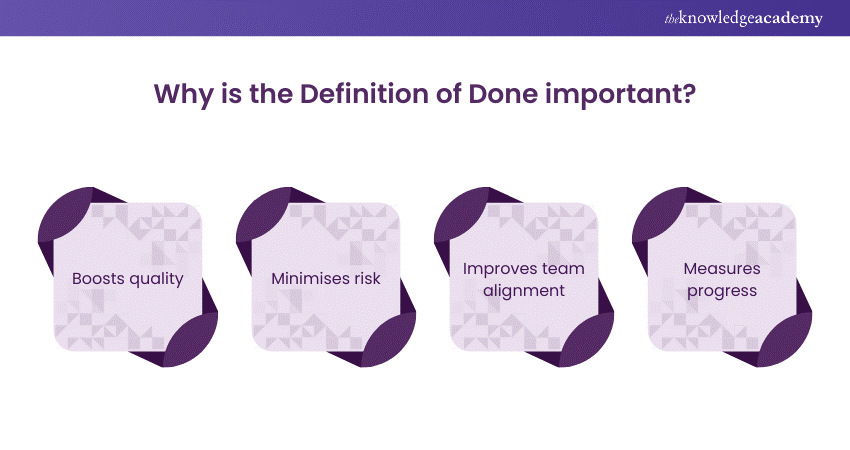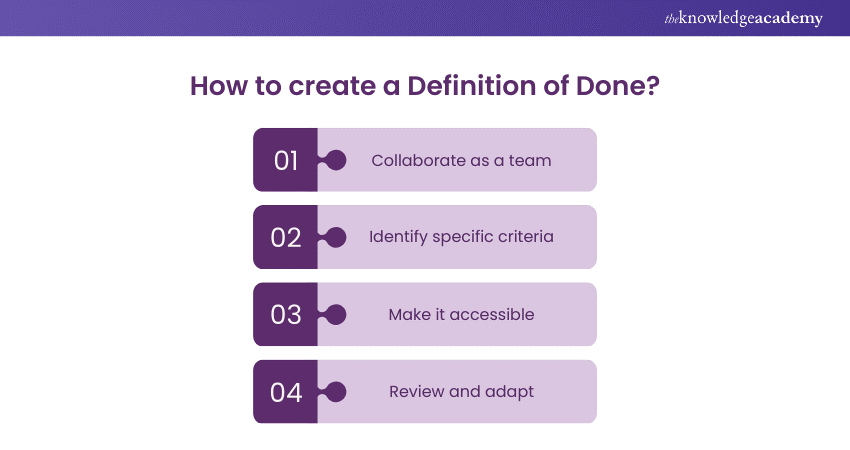We may not have the course you’re looking for. If you enquire or give us a call on +918037244591 and speak to our training experts, we may still be able to help with your training requirements.
We ensure quality, budget-alignment, and timely delivery by our expert instructors.

The Definition of Done (DoD) is a pivotal framework component that establishes clear and concrete criteria to evaluate when work items are truly complete, embodying the core principles of the Definition of Done in Scrum. This DoD acts as a contractual agreement between the team members about the requirements that a software product or any deliverable must meet to be released in iterations or at the end of a project.
The importance of a well-defined Definition of Done in Scrum cannot be overstated, as it directly impacts the quality, reliability, and timely delivery of the product. This blog explores how the DoD varies across different types of projects, highlighting specific examples that demonstrate the flexible yet consistent application of this critical Scrum practice.
Table of Contents
1) What is a Definition of Done (DoD)?
2) Why is the Definition of Done (DoD) important?
3) How to create a Definition of Done (DoD)?
4) Definition of Done examples
5) Conclusion
What is a Definition of Done?
The Definition of Done (DoD) is a formalised list of requirements that a project or deliverable must meet to be considered complete by the Scrum team. This checklist is collaboratively determined by all members of the team, including developers, product owners, and scrum masters, ensuring that everyone agrees on what “done” looks like. The DoD ensures transparency and quality in deliverables, aligning all team members under the same standards.
Why is the Definition of Done important?
A well-defined DoD ensures that all products meet quality standards and are complete in every sense. The importance of the DoD can be highlighted across four key areas:

Boosts quality
The DoD helps ensure that every deliverable meets a set standard of quality before it is considered complete. By defining what finished work looks like, the DoD includes criteria for code quality, adherence to design specifications, performance metrics, and more. This prevents the progression of work that does not meet the necessary standards, thereby enhancing the overall quality of the final product.
Minimises risk
Incorporating risk management into the DoD can significantly reduce potential issues that might otherwise escalate into serious problems. By requiring certain tests, reviews, and compliance checks before considering a task done, the DoD helps identify and mitigate risks early on, safeguarding the project from delays and cost overruns.
Boost your Agile projects skills with our Managing Agile Projects With Scrum Course - join today!
Improves team alignment
The DoD serves as a foundational communication tool that aligns all team members and stakeholders to a common understanding of project goals and standards. It clarifies expectations, which is particularly beneficial in teams where members may have varied interpretations of tasks and quality.
Measures progress
A well-defined DoD makes it easier to measure the progress of a project accurately. Since the completion of tasks is based on predefined criteria, project managers and team members can reliably track advancements against the DoD. This helps in providing transparent, objective, and straightforward status updates to stakeholders.
How to create a Definition of Done (DoD)?
Creating an effective Definition of Done (DoD) involves several steps:

a) Collaborate as a team: Gather input from all members of the Scrum team to ensure that the DoD encompasses all aspects of the project.
b) Identify specific criteria: List specific, measurable criteria that must be met for a task to be considered done. These might include code reviews, performance metrics, documentation, and more.
c) Make it accessible: Ensure the DoD is visible and accessible to all team members for constant reference.
d) Review and adapt: Regularly review the DoD with your team and update it as needed to adapt to new challenges or insights.
Enhance your organisational efficiency through our Scrum For Teams Course - join today!
Definition of Done (DoD) examples
The Definition of Done (DoD) can vary widely depending on the nature of the project and the team working on it. Here are examples of how the DoD can differ across various projects:
a) Mobile app development project: In a mobile app development project, the Definition of Done (DoD) ensures all User Interface (UI) elements are optimised for different devices. The DoD mandates rigorous performance testing to guarantee the app operates smoothly under various network conditions.
b) Software development project: For a software development project, the Definition of Done (DoD) includes the completion of all necessary security audits to protect user data and system integrity. It requires that the codebase is fully documented, facilitating easier maintenance and scalability.
c) Generic project: In a generic project, the Definition of Done (DoD) often involves ensuring all project objectives have been met and all deliverables are in alignment with the initial scope. The DoD requires a comprehensive review of the project outcomes against the original goals to ensure completeness.
Conclusion
The Definition of Done in Scrum is more than just a checklist; it's a foundational principle that ensures all team members have a clear and shared understanding of what it means for work to be truly complete. This understanding is crucial for maintaining high standards of quality and efficiency throughout the project lifecycle. Following this practice can significantly enhance the success and sustainability of projects across any domain.
Gain a deep understanding of the Scrum teams with our Scrum Product Owner Course - join today!
Frequently Asked Questions
Who creates the Definition of Done in Scrum?

The Definition of Done in Scrum is collaboratively created by the entire Scrum Team, including the Scrum Master, Product Owner, and Development Team.
What are the criteria for the Definition of Done in Scrum?

The criteria for the Definition of Done in Scrum are specific conditions that a product increment must meet to be considered complete and potentially releasable. These criteria typically include passing all required tests, meeting coding standards, completing documentation, and achieving stakeholder approval.
What are the other resources and offers provided by The Knowledge Academy?

The Knowledge Academy takes global learning to new heights, offering over 30,000 online courses across 490+ locations in 220 countries. This expansive reach ensures accessibility and convenience for learners worldwide.
Alongside our diverse Online Course Catalogue, encompassing 17 major categories, we go the extra mile by providing a plethora of free educational Online Resources like News updates, Blogs, videos, webinars, and interview questions. Tailoring learning experiences further, professionals can maximise value with customisable Course Bundles of TKA.
What is the Knowledge Pass, and how does it work?

The Knowledge Academy’s Knowledge Pass, a prepaid voucher, adds another layer of flexibility, allowing course bookings over a 12-month period. Join us on a journey where education knows no bounds.
What are related courses and blogs provided by The Knowledge Academy?

The Knowledge Academy offers various Scrum Certification Training, including Scrum Master Certification Course, Scrum Product Owner Training and Scrum Developer Training. These courses cater to different skill levels, providing comprehensive insights into Agile Project Management With Scrum.
Our Project Management Blogs cover a range of topics related to Scrum, offering valuable resources, best practices, and industry insights. Whether you are a beginner or looking to advance your Business Improvement skills, The Knowledge Academy's diverse courses and informative blogs have you covered.
Upcoming Project Management Resources Batches & Dates
Date
 Scrum Master Certification
Scrum Master Certification
Thu 6th Feb 2025
Thu 13th Feb 2025
Thu 20th Feb 2025
Thu 27th Feb 2025
Thu 6th Mar 2025
Thu 13th Mar 2025
Thu 20th Mar 2025
Thu 27th Mar 2025
Thu 3rd Apr 2025
Thu 1st May 2025
Thu 22nd May 2025
Thu 5th Jun 2025
Thu 19th Jun 2025
Thu 3rd Jul 2025
Thu 17th Jul 2025
Thu 31st Jul 2025
Thu 14th Aug 2025
Thu 11th Sep 2025
Thu 25th Sep 2025
Thu 2nd Oct 2025
Thu 9th Oct 2025
Thu 16th Oct 2025
Thu 23rd Oct 2025
Thu 30th Oct 2025
Thu 6th Nov 2025
Thu 13th Nov 2025
Thu 20th Nov 2025
Thu 27th Nov 2025
Thu 4th Dec 2025
Thu 11th Dec 2025
Thu 18th Dec 2025






 Top Rated Course
Top Rated Course



 If you wish to make any changes to your course, please
If you wish to make any changes to your course, please


